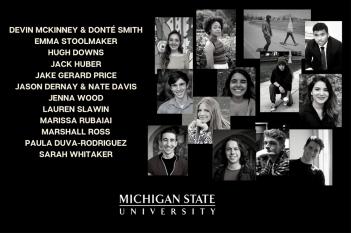
CREATE! Micro-Grant Virtual Exhibit
Courtesy of the College of Arts and Letters. View the original article here: https://cal.msu.edu/news/create-micro-grant-virtual-exhibit-launches-displaying-winning-projects/?sc_camp=C5792E5D342B45C688982386A82A7829&utm_source=msudaily-email&utm_medium=email&utm_campaign=standard-promo&utm_content=text2
The CREATE! Micro-Grant Program supported the launch of 12 student projects that analyze and respond to racial injustice and the struggles brought on by the ongoing COVID-19 pandemic. These projects, ranging from interpretive dance and musical performances to traditional Anishinaabe quill work, videos, podcasts, personal essays, and poetry, can now be viewed online through the CREATE! Micro-Grant Virtual Exhibit.
“What you will see is artists and writers facing their struggles head on, in form and content,” said Divya Victor, Associate Professor of Creative Writing and Transnational Poetry, who organized the competition. “What you will see is young change-makers using their art, music, materials, and language to pull themselves out of the pit of darkness and find their way through the riot of feeling within them. A riot that is within many of us.”
The CREATE! Micro-Grant Program jury selected 12 student project proposals to each receive $500 in funding. The winners then used the money to undertake their projects, which engaged in a variety of expressive mediums portraying messages about the ongoing COVID-19 pandemic. Many of the winning projects also reflected on the fight for social justice in the Black Lives Matter movement by producing art that responds to struggles brought on by the pandemic and acts of police brutality.
The CREATE! Micro-Grant program was made possible through the collaboration of the Michigan State College of Arts & Letters and the Dean’s Arts Advisory Council, with the support of several departments within MSU, including the Associate Provost for Undergraduate Education; Center for Interdisciplinarity; College of Arts & Letters; Department of Art, Art History, and Design; Department of English; Department of Theatre; Film Studies Program; Honors College; and the Residential College in the Arts and Humanities.
“The members of the Dean’s Arts Advisory Council are all artists, writers, filmmakers — we all have living arts practices that are helping us get through this difficult time,” Victor said. “We knew that supporting student arts and literary practice through the pandemic, even in a small way, would affirm the practical and emotional purpose of art-making, which is to clarify, document, and intervene into global situations in our own particular ways.”
Written by Alec Parr







